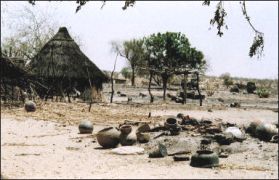Still not safe for IDPs to return home, Darfur magistrate admits
EL-FASHIR, Sudan, Aug 29 (AFP) — A prominent Sudanese magistrate and government advisor on Internally Displaced Persons (IDPs) in North Darfur state admitted Sunday it was still not safe for most of them to return home.
 “It would not be fair to insist that people return to such places,” Salah Eddin Sir al-Khatim Ali told AFP.
“It would not be fair to insist that people return to such places,” Salah Eddin Sir al-Khatim Ali told AFP.
“Most of the reasons that caused these people to flee their homes still exist,” said Ali, who heads a committee in the state overseeing the “voluntary” return of the IDPs.
The government, said Ali, had done a good job in securing certain areas but admitted “it is not sufficient.”
Until recently there were an estimated 400,000 IDPs in North Darfur, most of them in a dozen camps scattered across the region. About 300 others are believed to be living with relatives.
Sudanese officials have claimed that some 70,000 IDPs across the troubled western Darfur region have voluntarily returned home.
But in the camps, IDPs say that those who went home, lured by government promises of money or other benefits, returned almost immediately.
“Some of these people do not know where their interests lie. If I do not feel that the villages are safe enough I would not encourage anyone to return,” Ali said.
He said the number of those returning, especially in North Darfur, had now slowed to a trickle. “We have a problem with these returns,” he said.
He sad the problem was not, as assumed by both the government and the international community, limited to personal safety.
People fled their villages partly because of the security situation, but also because government services collapsed when officials fled rebel attacks.
There are also deep-rooted conflicts among various tribes, exercebated by the conflict and a sudden proliferation of weapons.
He said that simply deploying more security forces and police, as the United Nations and others are urging the government to do, will not solve the IDP problem.
He said he was in favor of people going back to their normal lives, but that their returns home should be “real” and not simply “political manoeuvers” by the state aimed at blunting international criticism.
He said that would require four things to happen: A comprehensive peace in the region; a resolution of decades-old tribal conflicts; the disarming of all armed groups other than “organized forces”; the restoration of basic services, particularly in the rural areas.
Sudan’s armed forces and their Arab militia allies cracked down on black African tribal groups in Darfur following an uprising in February 2003, forcing 1.2 million people from their homes and up to 200,000 into makeshift camps in neighboring Chad, the UN says.
The conflict has claimed up to 50,000 lives since early last year.
